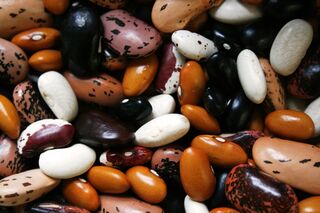by Susan McQuillan M.S., RDN
Eat this way, new research suggests, and you may live longer—a lot longer.
THE BASICS
Given a choice, would you want to extend your expected lifespan by three, six, maybe even 10 years? Researchers now say it may be possible, if you’re willing and able to change your diet. Based on a meta-analysis of the most reliable recent studies from Europe, China, and the United States, researchers in the Department of Global Public Health and Primary Care at the University of Bergen in Norway, have developed a “decision model” that calculates and predicts how your dietary choices can affect how long you live. While it’s much the same food news as we’ve been hearing for years—switching from a typical American (Western) diet to an optimal Mediterranean-style diet—these researchers also looked at what it could mean if you switch to a diet that is midway between the optimal diet and the and typical Western diet.

It turns out beans really are a magical food!Source: JanNijman/Pixabay
Understanding the Western diet
A typical Western diet is high in processed foods, red meat, high-fat dairy, and high-sugar foods. An optimal diet excludes, or contains lower amounts of, these foods, especially red and processed meats, and also includes many servings of fresh vegetables and fruits, whole grains, legumes, nuts, and seeds. In an optimal diet, this study found, the foods that make the most difference when it comes to improving health and longevity are:
- Legumes (lentils, split peas, and beans, such as black beans, kidney beans, pinto beans, garbanzo beans, cannellini beans, and others)
- Whole grains (bulgur, quinoa, oats, barley, brown rice)
- Nuts (walnuts, almonds, and others)
How much a particular eating style can improve your health and prevent illness depends, in great part, on how long you follow it. So the sooner in life that you start making healthier choices, the further you can potentially increase your lifespan. Knowing that an optimal diet is difficult for many people to follow for any number of reasons, the researchers also calculated how much longer a person could live if they adhere to a diet that is midway between standard Western and optimal. They called this the feasibility approach diet.
For young adults, the researchers found that switching to an optimal diet could extend life expectancy by more than a decade. For middle-aged adults, lifespan could be extended by six to seven years. Even for older people, switching to an optimal diet could increase life expectancy by 7 percent. In other words, it’s never too late.
Key takeaways
If you can make the switch to an optimal diet while you’re in your 20s, you could add 10 years to your life; at 60, you could add up to 8 years. Even switching at 80 could buy you an extra three years beyond your expected lifespan had you stuck to a less healthy diet. The results of this study found that simply switching to a more feasible diet without going all the way to optimal can still add significantly more time to your life.
Besides diet, many other factors affect individual life expectancy, such as genetics, medical history, and lifestyle habits, such as drinking alcohol, smoking, and exercise level. Like your diet, some of these are at least somewhat within your power to control, though they may be difficult to change. What science continues to show is that even small modifications in your diet and lifestyle choices can have meaningful effects on your overall health and longevity.

